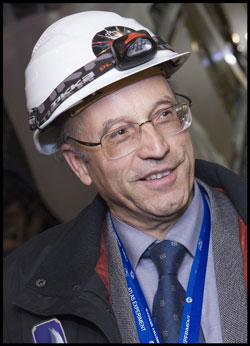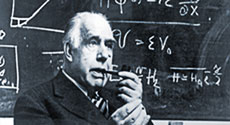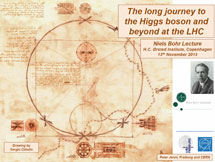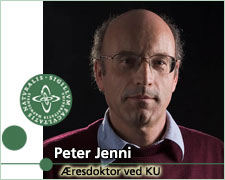Niels Bohr Lecture by Dr. Peter Jenni
The long journey to the Higgs boson and beyond at the LHC

Dr. Peter Jenni: After his retirement as a CERN Senior Research Staff end of April 2013, Peter Jenni has become a Guest Scientist with the Albert-Ludwigs-University Freiburg, Germany, keeping his full engagement with the ATLAS experiment.
Abstract: Since three years the experiments at the Large Hadron Collider (LHC) investigate particle physics at the highest collision energies ever achieved in a laboratory. Following a rich harvest of results for Standard Model (SM) physics came in 2012 the first spectacular discovery, by the ATLAS and CMS experiments observing a new, heavy particle which is most likely the long-awaited Higgs boson. The latest results with the full data sets accumulated over the first three-year running period of the LHC will be presented. Other, far-reaching results can be reported for exploratory new physics searches like Supersymmetry (SUSY) and its implication for Dark Matter in the Universe, Extra Dimensions, and the production of new heavy particles.
However, with this recent discovery of a heavy scalar boson the exciting journey into unexplored physics territory, within and beyond the SM, has only just begun at the LHC, in particular also in view of the increased collision energy expected for the next running period starting in 2015. Besides the first results and the future prospects, the talk will also touch on the history and the challenges of the whole LHC project, as well as on the fruitful collaboration of ATLAS with the NBI group since the very beginning of this large scientific adventure.
- Wednesday, November 13, 2013 at 16:00 in Aud. 3 at HCØ.
About Dr. Peter Jenni: Peter Jenni, Swiss, borne in 1948, obtained his Diploma for Physics at the University of Bern in 1973 and his Doctorate at the Swiss Federal Institute of Technology in Zürich (ETHZ) in 1976.
Peter Jenni participated in CERN experiments at the Synchro-Cyclotron (1972/3), at the Proton Synchrotron (1974/6), and as ETHZ Research Associate at the Intersecting Storage Rings (1976/7), the first high-energy hadron collider. During 1978/9, he was a Research Associate at the Stanford Linear Accelerator Centre (SLAC), USA. He became a CERN staff in 1980 with the UA2 experiment at the SPS collider (major involvement in the discoveries of jets and the W/Z bosons). His strong interest was with the Large Hadron Collider (LHC) since the beginning in 1984. From 1991 the main activities concentrated on tasks related to the informal spokespersonship first of a proto-Collaboration. In 1995, after formal approval of the ATLAS project, he was elected Spokesperson of the experiment, which today comprises some 3000 scientists representing 177 Institutions from 38 countries. He was re-elected several times and retired from this duty in February 2009, retaining however a strong involvement in the operation and physics of the experiment.
He has served on, and still is member of, numerous international science advisory committees. In particular, over the last 18 months he was strongly involved in shaping the scientific input with the Preparatory Group for the Update of the European Strategy for Particle Physics, personally motivated to promote CERN’s future at the high energy frontier.
After his retirement as a CERN Senior Research Staff end of April 2013, Peter Jenni has become a Guest Scientist with the Albert-Ludwigs-University Freiburg, Germany, keeping his full engagement with the ATLAS experiment.
He received (or shared) among others the Swiss Greinacher Prize in 1998, the Slovak gold medal of the Comenius University in 1999, the Czech Charles University memorial silver medal in 2001, the Czech Academy of Sciences Ernst Mach Honorary Medal in 2012, and in 2013 the German Julius Wess Award, a share of the Special Fundamental Physics Prize (FPP), and a share of the High Energy and Particle Physics Prize of the European Physical Society (EPS).
|
Coffee and Cookies
|

 Niels Bohr Lectures
Niels Bohr Lectures 

